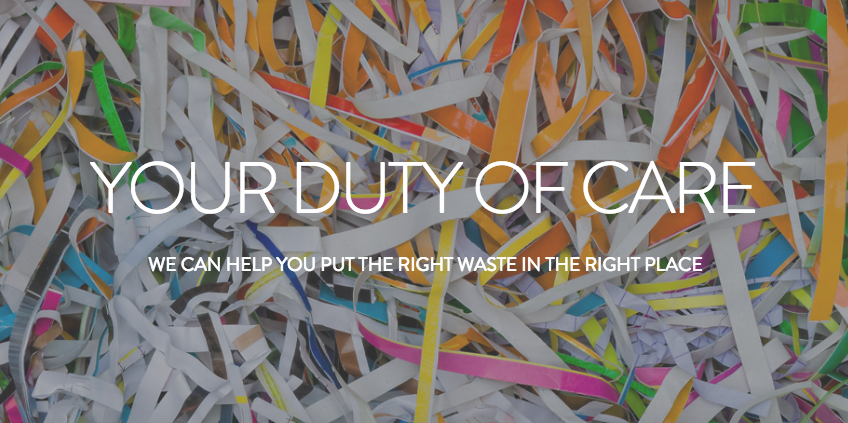
Right Waste, Right Place: What Is Your Duty of Care?
On Friday 28th April, Right Waste, Right Place hosted an open seminar in Preston at the County Hall. The seminar focused on the specific requirements of Duty of Care for the construction, agriculture and land management sectors and was well attended by people from various parts of the industry.
The morning was made up of 5 talks.
Alan Holmes from the Right Waste, Right Place campaign spoke about the importance of proper waste management procedures.
Mark Dunne from Trade Skips presented a real case study where our client actually saved money by being compliant.
Alexandra Evans presented a few practical tips for planning how to deal with waste from engineering projects.
Julian Silverwood explained the various challenges for the agriculture sector and his own innovative methods for turning waste into an asset.
Helen Simm took us through the legal requirements and potential consequences of failing to fulfill the Duty of Care.
Fulfilling Your Duty of Care
As the main theme for the day, all the speakers kept returning to the necessity of fulfilling the Duty of Care. This duty should not be seen as an inconvenience or something to be avoided, but as a method for putting the correct chain of disposal in place to ensure that waste is dealt with safely, efficiently and cost-effectively.
Alan Holmes’ background is in working for the Environment Agency but his most recent project, Right Waste, Right Place, is about educating the waste industry and those affected by it. In his words, the current use of waste descriptions is ‘woeful’ and he hopes that with better education and more awareness, this is a problem that should be solved easily.
To his mind, the Duty of Care is the glue that holds all the activities surrounding waste together. The DoC informs the permits required to handle the waste, who can carry and receive the waste, and where the waste should go. As a self-policing system, everyone who comes into contact with waste should be aware of their own DoC in order for it to work.
Mark Dunne picked up on this point, suggesting that part of the role of the waste management solutions company can be to ensure that everyone in the chain is fully compliant with their Duty of Care. At Trade Skips we pride ourselves on providing the correct service by using independent waste analysis to identify the waste, then ensuring that all the proper permits are in place to dispose of the waste.
He also believes that looking at the price of a waste carrier or receiver first can result in a false economy. There is no standard pricing in the skip business so knowing exactly what you are paying for is vital for procuring the right service at the best cost. This means that instead of just going for the cheapest, Trade Skips will look for the most appropriate solution for waste management and then find the most cost-effective of these solutions.
When you consider the cost of getting your Duty of Care wrong, spending a little more on independent waste analysis is likely to save you money in the long run. In his case study, Mark described a client who actually ended up saving £191,000 by spending ten times as much on waste analysis. This client was made fully compliant as well as in pocket.
Alexandra Evans was also a fan of planning the waste journey, especially in her field of civil engineering. As much of the waste produced on a building site can be reused elsewhere, it is important to plan how waste will be removed and where it will go. This means accurately labelling the waste with the proper EWC or LoW code plus a description detailing what the waste actually is.
She also suggested ways of reducing waste such as reusable packaging to deliver machinery and materials to site. This way, instead of using lots of packaging that must be disposed of on site, the packaging can be sent back to the depot and used again making the process cheaper and more space-efficient.
But not all waste is bad waste.
Julian Silverwood is using his company – Silverwoods – to match waste producers with farmers who can make use of their waste. For example, paper mills produce waste paper sludge which can either be disposed of or sold to a farmer who can use it as bedding for his animals. As long as the farmer has the appropriate permit, this is a perfectly legal form of recycling that we should be encouraging.
Permitting and legal requirements are Helen Simm’s specialism. She discussed the risks waste producers, carriers and receivers are taking when they do not have the appropriate permits for their activity. As the Environment Agency has toughened the laws, courts are also toughening up and giving significantly larger fines and even prison sentences to the worst offenders. Essentially, getting compliance wrong can be very expensive and pleading ignorance is not an option.
The best way to ensure that you are compliant is to educate yourself. If you are unsure of what you need to be doing in order to be compliant, there are two things you can do: go to the Right Waste, Right Place website for more information about laws, procedures and permits and go to a waste management solutions company, like Trade Skips, and let us put a waste management plan in place for you.
